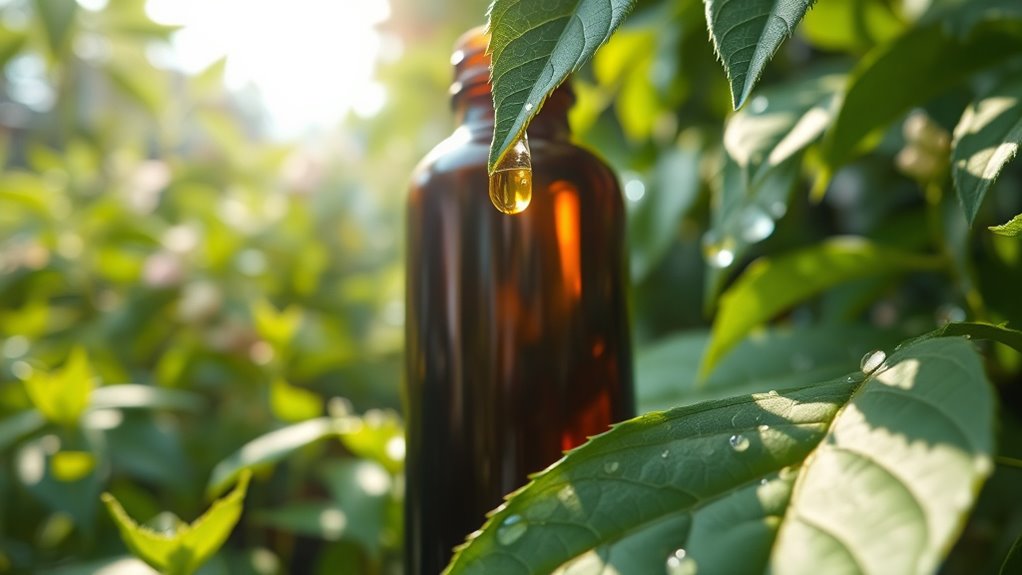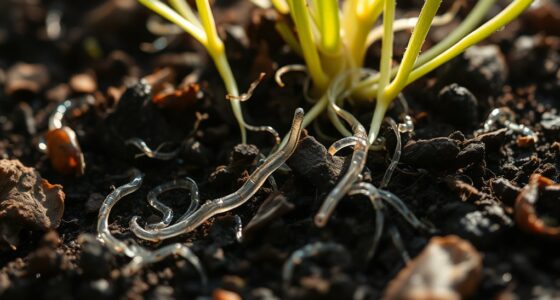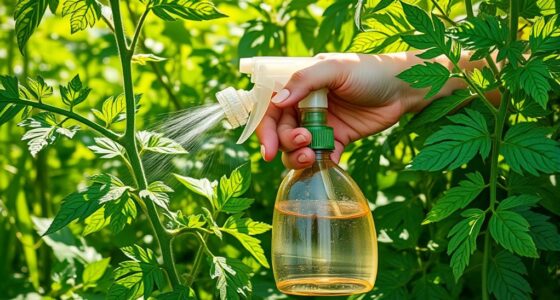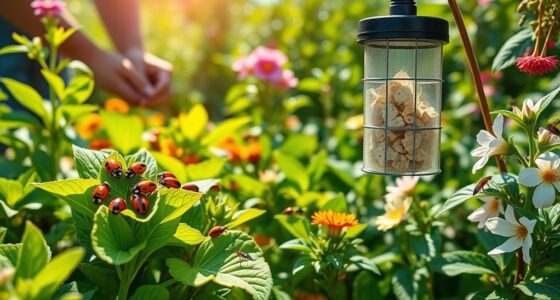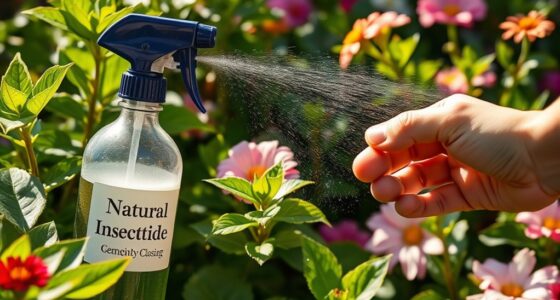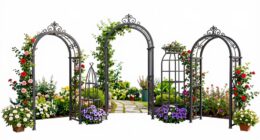To use neem oil safely, mix a small amount with water and an emulsifier like soap or horticultural oil. Apply during early morning or late evening to avoid leaf burn, focusing on undersides of leaves. Test on a small area first and avoid applying on stressed plants or flowering parts to protect beneficial insects. Proper, consistent use helps keep pests in check naturally. If you keep exploring, you’ll discover even more effective application tips.
Key Takeaways
- Always dilute neem oil with water and an emulsifier before application to ensure even coverage.
- Apply during early morning or late evening to prevent leaf burn and maximize efficacy.
- Test the solution on a small plant area first to check for any adverse reactions.
- Focus on undersides of leaves and avoid flowering parts to protect pollinators and beneficial insects.
- Use consistently every 7-14 days as part of an integrated pest management strategy for best results.
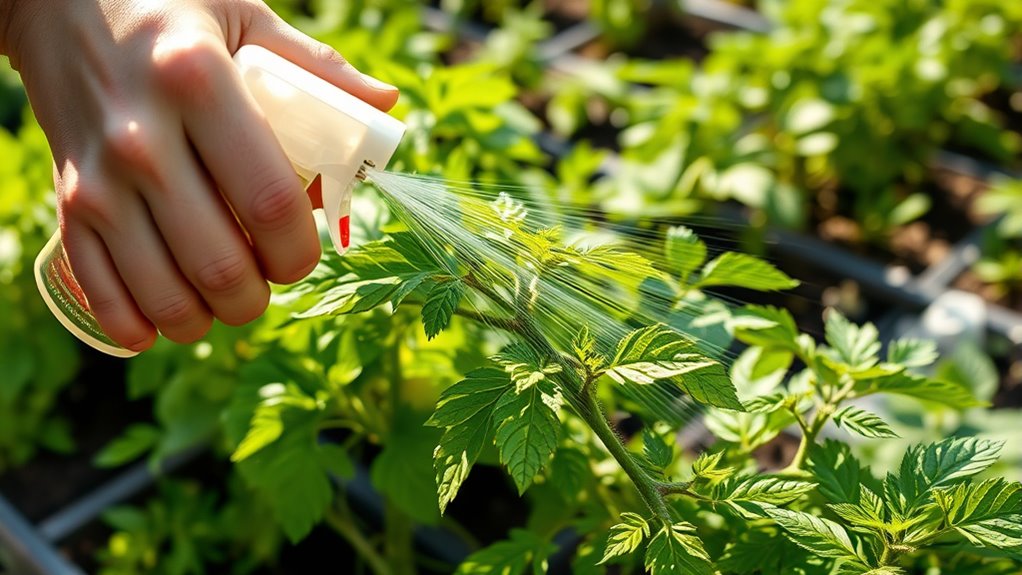
Have you ever wondered how a natural remedy can transform your gardening and skincare routines? Neem oil is one such versatile product that’s gaining popularity among eco-conscious gardeners and enthusiasts. When used correctly, it becomes a powerful tool for natural pest control and supports organic gardening practices. Unlike chemical pesticides, neem oil is derived from the seeds of the neem tree and offers a safe, environmentally friendly way to protect your plants. Its broad-spectrum effectiveness means you can ward off a variety of pests without harming beneficial insects or pollinators, making it ideal for organic gardening.
To get started, you’ll want to understand how to properly prepare and apply neem oil. Typically, you mix a small amount of neem oil with water and a gentle soap or horticultural oil as an emulsifier. This mixture creates a solution that evenly coats plant surfaces, targeting pests like aphids, whiteflies, and spider mites. It’s best to apply neem oil during the early morning or late evening when the sun isn’t at its peak. Doing so prevents leaf burn and ensures the oil adheres effectively to the plant’s surface. Remember, consistency is key; applying every 7 to 14 days can help keep pests at bay while promoting healthy, organic gardening practices.
You should also be aware of some safety precautions to ensure you’re using neem oil safely on your plants. Always follow the manufacturer’s instructions regarding dilution ratios and application frequency. It’s a good idea to test the solution on a small part of the plant first to check for any adverse reactions. Avoid applying neem oil to stressed or drought-stressed plants, as they’re more sensitive to the oil. Furthermore, neem oil can sometimes affect beneficial insects if applied directly to flowers, so target the undersides of leaves and avoid flowering parts if possible. Proper application not only protects your plants but also preserves the ecological balance in your garden.
Using neem oil in your gardening routine is a smart step toward embracing natural pest control and fostering a healthier garden environment. Its organic properties align perfectly with sustainable gardening practices, reducing your reliance on chemical pesticides that can harm the soil and beneficial insects. An understanding of pest control strategies can help you optimize your use of neem oil and other organic methods. When integrated carefully, neem oil enhances plant health, keeps pests under control, and supports the overall integrity of your organic garden. So, next time you’re facing pest issues, consider turning to neem oil—your garden’s natural ally that’s safe, effective, and environmentally friendly.
Frequently Asked Questions
Can Neem Oil Harm Beneficial Insects in My Garden?
You might wonder if neem oil harms beneficial insects in your garden. While neem oil is effective for pest management, it can affect beneficial insects if applied directly to them or if they come into contact with it during treatment. To protect these helpful creatures, apply neem oil carefully, ideally when beneficial insects are less active, and avoid spraying flowers or leaves where they gather. This helps maintain a healthy balance in your garden ecosystem.
How Often Should I Reapply Neem Oil for Pest Control?
You should reapply neem oil based on the pest lifecycle and the severity of infestation. Usually, an application frequency of every 7 to 14 days works well, especially during active pest periods. Keep monitoring your plants and reapply as needed, especially if new pests appear or damage continues. Consistent application helps break the pest lifecycle effectively while minimizing harm to beneficial insects.
Is Neem Oil Safe for Edible Plants and Herbs?
You might wonder if neem oil is safe for edible plants and herbs. Generally, neem oil is considered safe when used properly, but you should always check the label for edible plant safety. To protect your herbs, apply neem oil during the early morning or late evening and rinse thoroughly before harvesting. Following herb cultivation tips guarantees your plants stay healthy without risking ingestion of residues.
What Are the Signs of Neem Oil Overuse on Plants?
You might notice plant stress or leaf discoloration if you overuse neem oil. Excess application can cause leaves to turn yellow or brown, and may weaken your plants’ overall health. Look for wilting or spotting, which signals over-treatment. To prevent this, always follow the recommended dosage and frequency. If you see these signs, rinse your plants with water and reduce neem oil use to avoid further stress.
Can Neem Oil Be Mixed With Other Garden Pesticides Safely?
You can mix neem oil with other garden pesticides, but you should always follow compatibility testing and mixing guidelines first. Check labels and manufacturer instructions to verify they won’t react negatively. Perform a small patch test if unsure, and always dilute properly before application. This helps prevent plant damage and keeps your garden safe. When in doubt, consult product labels or expert advice for safe, effective mixing practices.
Conclusion
Now that you know how to use neem oil safely, you hold the power to protect your plants naturally. Think of it as a shield, guarding your garden against pests without harming your beloved greenery. With careful application, neem oil becomes your trusted ally in nurturing a healthy, vibrant garden. So, are you ready to release its full potential and watch your plants thrive? Your garden’s future is in your hands—step forward and let neem oil work its magic.
